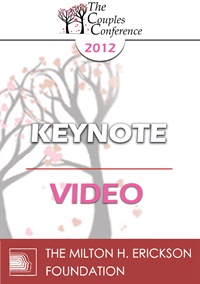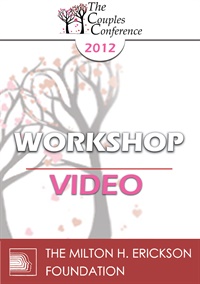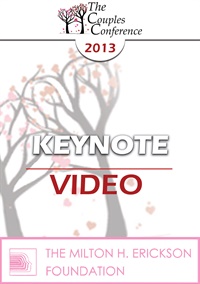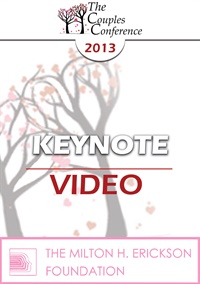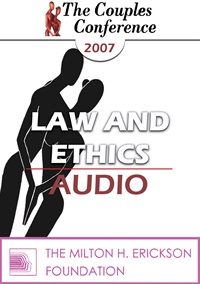
- Average Rating:
- Not yet rated
- Topic Areas:
- Law & Ethics | Therapist Development
- Categories:
- Couples Conference | Couples Conference 2007
- Faculty:
- A. Steven Frankel, PhD, JD, ABPP
- Duration:
- 1:41:00
- Format:
- Audio Only
- Original Program Date:
- Apr 26, 2007
- Short Description:
- This program focuses more closely on the needs of clinicians who fall into particularly high risk groups. Topics include confidentiality and privilege for children, coping with high-conflict divorce/custody families, the regressive impact of the regulatory environment on family therapy in particular, supervision/consultation issues that arise for professionals whose agency positions may include functions that conflict with ethical codes.
- Price:
- $15.00 - Base Price
Tags: Ethics Law Therapist Development
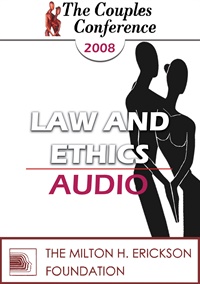
- Average Rating:
- Not yet rated
- Topic Areas:
- Law & Ethics | Therapist Development
- Categories:
- Couples Conference | Couples Conference 2008
- Faculty:
- A. Steven Frankel, PhD, JD, ABPP
- Duration:
- 3:27:00
- Format:
- Audio Only
- Original Program Date:
- Apr 24, 2008
- Short Description:
- The Law and Ethics Workshop covers emerging legal and ethical issues for mental health practitioners of all disciplines. The four-hour program addresses issues including confidentiality and privilege, note-taking, record-keeping, coping with subpoenas, the impact of professional society ethical codes on regulation of mental health practice, liability exposure with suicidal patients, and recent developments in “Tarasoff situations.”
- Price:
- $15.00 - Base Price
Tags: Ethics Law Therapist Development
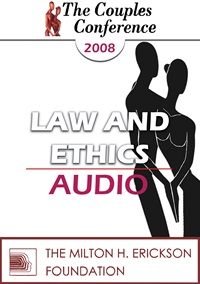
- Average Rating:
- Not yet rated
- Topic Areas:
- Law & Ethics | Therapist Development
- Categories:
- Couples Conference | Couples Conference 2008
- Faculty:
- A. Steven Frankel, PhD, JD, ABPP
- Duration:
- 1:48:58
- Format:
- Audio Only
- Original Program Date:
- Apr 24, 2008
- Short Description:
- This program focuses more closely on the needs of clinicians who fall into particularly high risk groups. Topics include confidentiality and privilege for children, coping with high-conflict divorce/custody families, the regressive impact of the regulatory environment on family therapy in particular, supervision/consultation issues that arise for professionals whose agency positions may include functions that conflict with ethical codes.
- Price:
- $15.00 - Base Price
Tags: Ethics Law Therapist Development
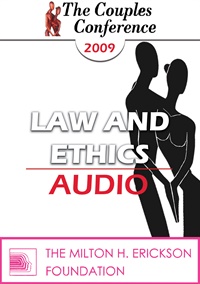
- Average Rating:
- Not yet rated
- Topic Areas:
- Law & Ethics | Therapist Development
- Categories:
- Couples Conference | Couples Conference 2009
- Faculty:
- A. Steven Frankel, PhD, JD, ABPP
- Duration:
- 3:34:47
- Format:
- Audio Only
- Original Program Date:
- Apr 30, 2009
- Short Description:
- The Law and Ethics Workshop covers emerging legal and ethical issues for mental health practitioners of all disciplines. The four-hour program addresses issues including confidentiali- ty and privilege, note-taking, record-keeping, coping with subpoenas, the impact of professional society ethical codes on regulation of mental health practice, liability exposure with suicidal patients, and recent developments in “Tarasoff situations.”
- Price:
- $15.00 - Base Price
Tags: Ethics Law Therapist Development
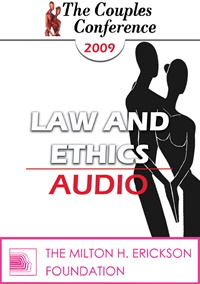
- Average Rating:
- Not yet rated
- Topic Areas:
- Law & Ethics | Therapist Development
- Categories:
- Couples Conference | Couples Conference 2009
- Faculty:
- A. Steven Frankel, PhD, JD, ABPP
- Duration:
- 1:45:43
- Format:
- Audio Only
- Original Program Date:
- Apr 30, 2009
- Short Description:
- This program focuses more closely on the needs of clinicians who fall into particularly high risk groups. Topics include confidentiality and privilege for children, coping with high-conflict divorce/custody families, the regressive impact of the regulatory environment on family therapy in particular, supervision/ consultation issues that arise for professionals whose agency positions may include functions that conflict with ethical codes.
- Price:
- $15.00 - Base Price
Tags: Ethics Law Therapist Development
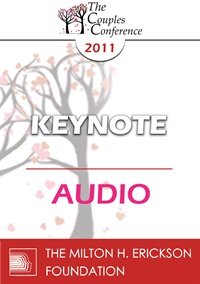
- Average Rating:
- Not yet rated
- Topic Areas:
- Couples Therapy | Keynotes | Therapist Development | Cultural and Social Contexts
- Categories:
- Couples Conference | Couples Conference 2011 | Pioneers in Couples and Family Therapy
- Faculty:
- William Doherty, PhD
- Duration:
- 59:52
- Format:
- Audio Only
- Original Program Date:
- Apr 02, 2011
- Short Description:
- A renowned marriage therapist addresses common pitfalls in couples therapy, highlighting the importance of structured sessions, managing conflict, and empathizing equally with both partners. Practical insights include handling pivotal moments, such as reconciliation attempts, framing therapy as a trial period, and addressing gaps in therapist training.
- Price:
- $15.00 - Base Price
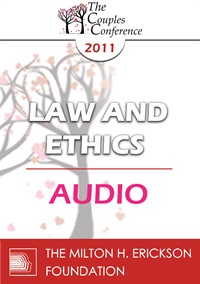
- Average Rating:
- Not yet rated
- Topic Areas:
- Law & Ethics | Therapist Development
- Categories:
- Couples Conference | Couples Conference 2011
- Faculty:
- A. Steven Frankel, PhD, JD, ABPP
- Duration:
- 3:39:29
- Format:
- Audio Only
- Original Program Date:
- Mar 31, 2011
- Short Description:
- This workshop reviews the areas of professional functions that have been most associated with regulatory problems for mental health professionals, including sexual and nonsexual boundary violations, “law-psych” interfaces, competence, “moral” offenses, licensing board and malpractice actions. The workshop covers causes for these problems and ways of avoiding them and/or managing them.
- Price:
- $15.00 - Base Price
Tags: Ethics Law Therapist Development
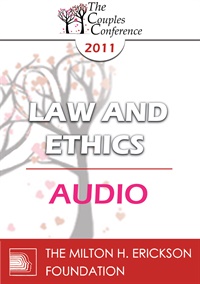
- Average Rating:
- Not yet rated
- Topic Areas:
- Law & Ethics | Therapist Development
- Categories:
- Couples Conference | Couples Conference 2011
- Faculty:
- A. Steven Frankel, PhD, JD, ABPP
- Duration:
- 1:54:43
- Format:
- Audio Only
- Original Program Date:
- Mar 31, 2011
- Short Description:
- This workshop reviews the areas of professional functions that have been most associated with regulatory problems for mental health professionals, including sexual and nonsexual boundary violations, “law-psych” interfaces, competence, “moral” offenses, licensing board and malpractice actions. The workshop covers causes for these problems and ways of avoiding them and/or managing them.
- Price:
- $15.00 - Base Price
Tags: Ethics Law Therapist Development
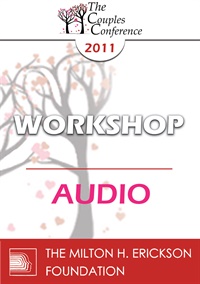
- Average Rating:
- Not yet rated
- Topic Areas:
- Couples Therapy | Workshops | Motivation | Neurobiology | Therapist Development
- Categories:
- Couples Conference | Couples Conference 2011
- Faculty:
- Jette Simon
- Duration:
- 1:41:46
- Format:
- Audio Only
- Original Program Date:
- Apr 01, 2011
- Short Description:
- Knowing how to elicit positive emotion even in couples steeped in intensely negative interactions is the key to providing the motivation for change. In this workshop, we’ll explore a variety of ways for creating “magical moments” in the therapy hour that offer a new template for couples, otherwise trapped in dysfunction, to allay repetitive cycles. You’ll learn how to use tools like focusing, sentence stems, doubling and directives to invite couples into new kinds of experience of connection. We’ll also examine the neurobiological principles that enable partners to expect and attract more positive experiences from each other.
- Price:
- $15.00 - Base Price
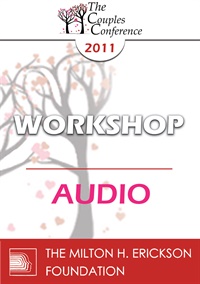
- Average Rating:
- Not yet rated
- Topic Areas:
- Couples Therapy | Workshops | Experiential Therapy | Attunement | Therapist Development
- Categories:
- Couples Conference | Couples Conference 2011
- Faculty:
- Jeffrey Zeig, PhD | Lilian Borges, MA, LPC
- Duration:
- 1:51:14
- Format:
- Audio Only
- Original Program Date:
- Apr 03, 2011
- Short Description:
- People change due to the experiences they live, more than the information they receive. A brief overview of the experiential approach will be followed by a demonstration and discussion of the experiential methods used for assessment and treatment, which include couples and therapist sculpting, attunement, and the use of signals.
- Price:
- $15.00 - Base Price
- Average Rating:
- Not yet rated
- Topic Areas:
- Couples Therapy | Keynotes | Therapist Development
- Categories:
- Couples Conference | Couples Conference 2012 | Pioneers in Couples and Family Therapy
- Faculty:
- William Doherty, PhD
- Course Levels:
- Master Degree or Higher in Health-Related Field
- Duration:
- 57:04
- Format:
- Audio and Video
- Original Program Date:
- Apr 27, 2012
- Short Description:
- We have advanced training opportunities in couples therapy these days, but not a lot of training in the everyday skills of conducting sessions with couples who interrupt each other, flare at each other, mind read, and emotionally bail out of sessions. Here’s an hour’s worth of practical tools.
- Price:
-
Sale is $29.00
price reduced from Base Price - $59.00
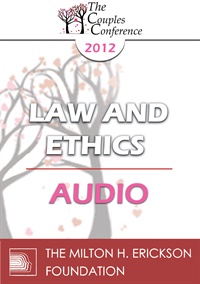
- Average Rating:
- Not yet rated
- Topic Areas:
- Law & Ethics | Therapist Development
- Categories:
- Couples Conference | Couples Conference 2012
- Faculty:
- A. Steven Frankel, PhD, JD, ABPP
- Duration:
- 3:41:58
- Format:
- Audio Only
- Original Program Date:
- Apr 26, 2012
- Short Description:
- This workshop in law, ethics and regulation focuses on three of the four most frequent causes for actions against mental health professionals, nationwide. Since the 2010-2011 law/ethics/regulation workshop focused primarily on boundary violations (including sexual contact between professional and patient/client), this 2012 -2013 workshop focuses on incompetence, criminal convictions and cases involving high conflict custody problems.
- Price:
- $15.00 - Base Price
Tags: Ethics Law Therapist Development

- Average Rating:
- Not yet rated
- Topic Areas:
- Law & Ethics | Therapist Development
- Categories:
- Couples Conference | Couples Conference 2012
- Faculty:
- A. Steven Frankel, PhD, JD, ABPP
- Duration:
- 1:56:01
- Format:
- Audio Only
- Original Program Date:
- Apr 26, 2012
- Short Description:
- This workshop in law, ethics and regulation focuses on three of the four most frequent causes for actions against mental health professionals, nationwide. Since the 2010-2011 law/ethics/regulation workshop focused primarily on boundary violations (including sexual contact between professional and patient/client), this 2012 -2013 workshop focuses on incompetence, criminal convictions and cases involving high conflict custody problems.
- Price:
- $15.00 - Base Price
Tags: Ethics Law Therapist Development
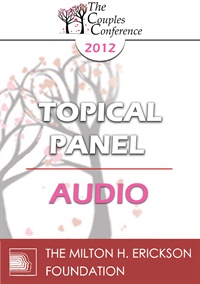
- Average Rating:
- Not yet rated
- Topic Areas:
- Attachment | Couples Therapy | Neuroscience | Topical Panels | Therapist Development
- Categories:
- Couples Conference | Couples Conference 2012 | Pioneers in Couples and Family Therapy
- Faculty:
- Rick Hanson, PhD | Harville Hendrix, PhD | Stan Tatkin, PsyD, MFT | Scott R. Woolley, PhD
- Duration:
- 59:38
- Format:
- Audio Only
- Original Program Date:
- Apr 28, 2012
- Short Description:
- This panel explores how attachment theory and neuroscience shape couples therapy. It emphasizes the importance of secure bonds, therapist presence, emotional attunement, and brain-based insights into relational dynamics. Panelists examine how early attachment, brain function, and cultural context influence therapeutic effectiveness.
- Price:
- $15.00 - Base Price
- Average Rating:
- Not yet rated
- Topic Areas:
- Workshops | Couples Therapy | Therapist Development
- Categories:
- Couples Conference | Couples Conference 2012
- Faculty:
- Harville Hendrix, PhD
- Course Levels:
- Master Degree or Higher in Health-Related Field
- Duration:
- 1:59:16
- Format:
- Audio and Video
- Original Program Date:
- Apr 27, 2012
- Short Description:
- Some couples seem intractable and unchangeable, and their devotion to maintaining their misery seems mysterious. We often dread their next appointment. This workshop will demystify this well- known dynamic and describe and demonstrate concepts and processes that make working with the Couple-from-Hell joyful, even desirable.
- Price:
-
Sale is $29.00
price reduced from Base Price - $59.00
- Average Rating:
- Not yet rated
- Topic Areas:
- Keynotes | Love | Couples Therapy | Relational Life Therapy Model (RLT) | Therapist Development
- Categories:
- Couples Conference | Couples Conference 2013 | Pioneers in Couples and Family Therapy
- Faculty:
- Terry Real, LICSW
- Course Levels:
- Master Degree or Higher in Health-Related Field
- Duration:
- 48:07
- Format:
- Audio and Video
- Original Program Date:
- Apr 19, 2013
- Short Description:
- We’ve never wanted more from our romantic relationships but both men and women—in different ways and for different reasons—lack the skills to meet our new ambitions. What do men and women want from each other? Why are relationships so fraught? And how can we be more effective as clinicians? The nature of marriage has changed and therapists must meet challenges unique to our new landscape.
- Price:
-
Sale is $29.00
price reduced from Base Price - $59.00
- Average Rating:
- Not yet rated
- Topic Areas:
- Couples Therapy | Keynotes | Marriage | Therapist Development
- Categories:
- Couples Conference | Couples Conference 2013 | Pioneers in Couples and Family Therapy
- Faculty:
- Michele Weiner-Davis, LCSW
- Course Levels:
- Master Degree or Higher in Health-Related Field
- Duration:
- 57:32
- Format:
- Audio and Video
- Original Program Date:
- Apr 19, 2013
- Short Description:
- This keynote invites therapists to become champions of last-chance couples. Blending clinical insight with personal conviction, it explores how therapist mindset shapes outcomes, especially when hope feels lost. Drawing on ideas like the “walk-away wife” and the power of emotional effort, it encourages relational optimism, everyday advocacy, and staying attuned to what helps partners reconnect.
- Price:
-
Sale is $29.00
price reduced from Base Price - $59.00
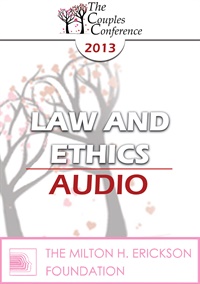
- Average Rating:
- Not yet rated
- Topic Areas:
- Law & Ethics | Therapist Development
- Categories:
- Couples Conference | Couples Conference 2013
- Faculty:
- A. Steven Frankel, PhD, JD, ABPP
- Duration:
- 3:11:12
- Format:
- Audio Only
- Original Program Date:
- Apr 18, 2013
- Short Description:
- This workshop in law, ethics and regulation focuses on three of the four most frequent causes for actions against mental health professionals, nationwide. Since the 2010-2011 law/ethics/regulation workshop focused primarily on boundary violations (including sexual contact between professional and patient/client), this 2012-2013 workshop focuses on incompetence, criminal convictions and cases involving high conflict custody problems. The workshop emphasizes awareness and management of risk factors in the major areas of high risk practice via music videos illustrating the principles taught in the program.
- Price:
- $15.00 - Base Price
Tags: Ethics Law Therapist Development
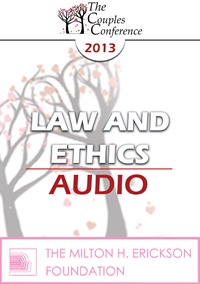
- Average Rating:
- Not yet rated
- Topic Areas:
- Law & Ethics | Therapist Development
- Categories:
- Couples Conference | Couples Conference 2013
- Faculty:
- A. Steven Frankel, PhD, JD, ABPP
- Duration:
- 1:46:08
- Format:
- Audio Only
- Original Program Date:
- Apr 18, 2013
- Short Description:
- This workshop in law, ethics and regulation focuses on three of the four most frequent causes for actions against mental health professionals, nationwide. Since the 2010-2011 law/ethics/regulation workshop focused primarily on boundary violations (including sexual contact between professional and patient/client), this 2012-2013 workshop focuses on incompetence, criminal convictions and cases involving high conflict custody problems. The workshop emphasizes awareness and management of risk factors in the major areas of high risk practice via music videos illustrating the principles taught in the program.
- Price:
- $15.00 - Base Price
Tags: Ethics Law Therapist Development

- Average Rating:
- Not yet rated
- Topic Areas:
- Couples Therapy | Workshops | Love | Therapist Development
- Categories:
- Couples Conference | Couples Conference 2013
- Faculty:
- Bill O'Hanlon, MS
- Duration:
- 1:23:36
- Format:
- Audio Only
- Original Program Date:
- Apr 20, 2013
- Short Description:
- Using movie clips, this presentation will illustrate a simple five-step model for effectively intervening with couples. Bring the popcorn and have fun while you learn.
- Price:
- $15.00 - Base Price
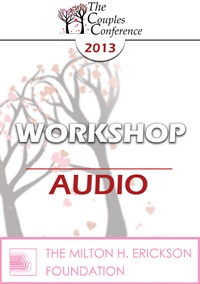
- Average Rating:
- Not yet rated
- Topic Areas:
- Couples Therapy | Workshops | Therapist Development | Trauma
- Categories:
- Couples Conference | Couples Conference 2013
- Faculty:
- Peter Pearson, PhD
- Duration:
- 1:38:55
- Format:
- Audio Only
- Original Program Date:
- Apr 21, 2013
- Short Description:
- Volatile couples come to couples therapy with a fearsome mixture of trauma, devastated dreams, and defensive attitudes. If you ask about their goals or how you can help, you quickly get intense cross complaints, and pressure to fix their partner. Simply trying to understand their problems and asking about their goals can be a toxic beginning as their defensiveness and trauma get re-triggered. This innovative approach is the result of 30 years of seeing couples and searching for a better beginning. In this workshop you will understand how to have each person identify their role in the distress, accept accountability for self-change, identify personal growth changes that are a stretch, create the foundation to work as a team and do it all with a spirit of cooperation and positive strokes. Do all this and more in the first session.
- Price:
- $15.00 - Base Price
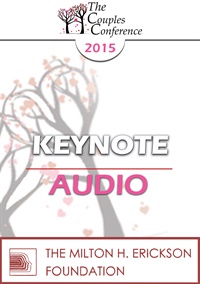
- Average Rating:
- Not yet rated
- Topic Areas:
- Couples Therapy | Keynotes | Multicultural | Therapist Development
- Categories:
- Couples Conference | Couples Conference 2015 | Pioneers in Couples and Family Therapy
- Faculty:
- William Doherty, PhD
- Duration:
- 48:19
- Format:
- Audio Only
- Original Program Date:
- Apr 26, 2015
- Short Description:
- What do you do with couples who are split on trying to working on their relationship or calling it quits? They are often poor candidate for traditional couples therapy but they are idea candidates for "Discernment Counseling," a creative way of working with couples our therapy models are not designed for. We will discuss the difference between couples therapy and discernment counseling.
- Price:
- $15.00 - Base Price
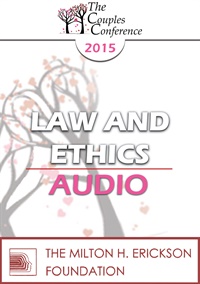
- Average Rating:
- Not yet rated
- Topic Areas:
- Law & Ethics | Therapist Development
- Categories:
- Couples Conference | Couples Conference 2015
- Faculty:
- A. Steven Frankel, PhD, JD, ABPP
- Duration:
- 5:16:28
- Format:
- Audio Only
- Original Program Date:
- Apr 23, 2015
- Short Description:
- This 6-hour program addresses the profound changes that are taking place in the health system in the U.S., the implications for mental health care, and, in turn, the implications for mental health care providers. We begin with a discussion of the role of the insurance industry in health care and how that role has expanded over the past 50-60 years, affecting the licensure and practices of mental health professionals.
- Price:
- $30.00 - Base Price
Tags: Ethics Law Therapist Development
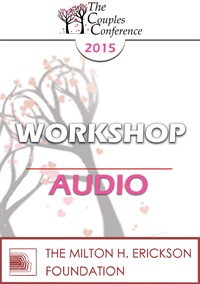
- Average Rating:
- Not yet rated
- Topic Areas:
- Couples Therapy | Workshops | Psychobiological Approach to Couples Therapy (PACT) | Therapist Development
- Categories:
- Couples Conference | Couples Conference 2015 | Pioneers in Couples and Family Therapy
- Faculty:
- Stan Tatkin, PsyD, MFT
- Duration:
- 1:54:28
- Format:
- Audio Only
- Original Program Date:
- Apr 24, 2015
- Short Description:
- This workshop explores couple therapy with highly disorganized partners, where therapeutic structure and stance are essential. Using attachment, regulation, and neurobiological models, it addresses trauma-related dysregulation. Clinical examples illustrate how facial cues, pacing, and therapist attunement support emotional regulation and relational repair in the face of volatility.
- Price:
- $15.00 - Base Price
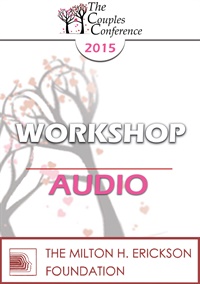
- Average Rating:
- Not yet rated
- Topic Areas:
- Couples Therapy | Workshops | Therapist Development
- Categories:
- Couples Conference | Couples Conference 2015 | Pioneers in Couples and Family Therapy
- Faculty:
- William Doherty, PhD
- Duration:
- 1:42:09
- Format:
- Audio Only
- Original Program Date:
- Apr 25, 2015
- Short Description:
- How to work with partners who are leaning in difference directions about staying together and trying therapy. Learn core techniques and see a video demonstration of how to work confidently with these challenging couples. You will learn the key pathways offered couples in Discernment Counseling.
- Price:
- $15.00 - Base Price


